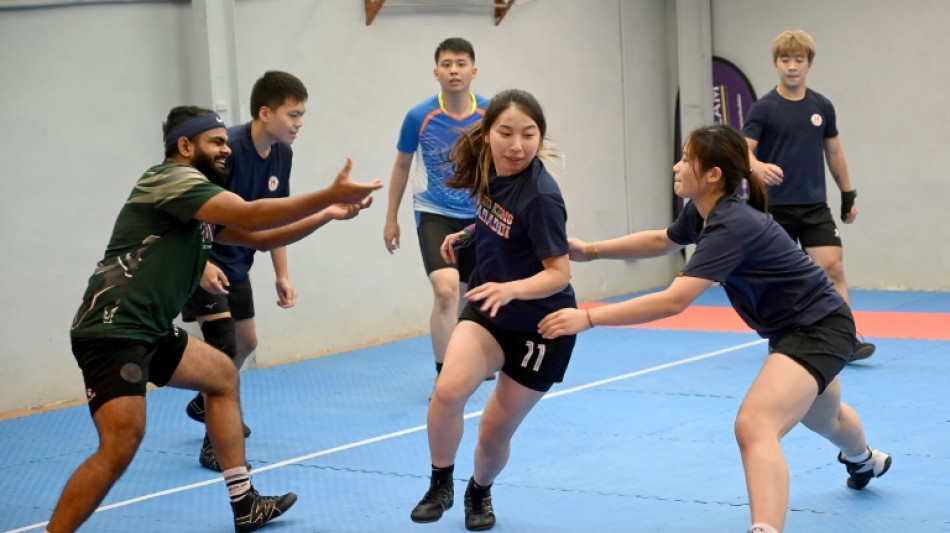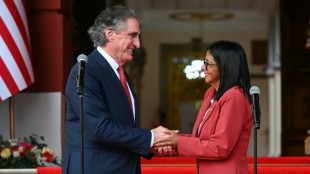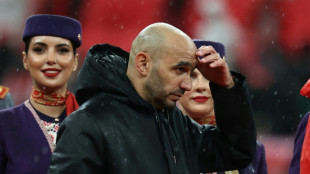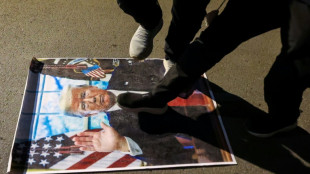
-
 US says Venezuela to protect mining firms as diplomatic ties restored
US says Venezuela to protect mining firms as diplomatic ties restored
-
Trump honors Messi and MLS Cup champion Miami teammates

-
 Dismal Spurs can still avoid relegation vows Tudor
Dismal Spurs can still avoid relegation vows Tudor
-
Berger sets early pace at Arnold Palmer with 'unbelievable' 63

-
 Morocco part company with coach Regragui as World Cup looms
Morocco part company with coach Regragui as World Cup looms
-
Lens beat Lyon on penalties to reach French Cup semis

-
 El Salvador's Bukele holding dozens of political prisoners: rights group
El Salvador's Bukele holding dozens of political prisoners: rights group
-
With Iran war, US goes it alone like never before

-
 Spurs slip deeper into relegation trouble after loss to Palace
Spurs slip deeper into relegation trouble after loss to Palace
-
European, US stocks back in sell-off mode as oil prices surge

-
 Pete Hegseth: Trump's Iran war attack dog
Pete Hegseth: Trump's Iran war attack dog
-
Celtics' Tatum could make injury return on Friday

-
 'Enemy at home': Iranian authorities tighten grip as war rages
'Enemy at home': Iranian authorities tighten grip as war rages
-
Bethell set for 'hell of a career', says England captain Brook

-
 France coach Galthie slams Scotland for 'smallest changing room in the world'
France coach Galthie slams Scotland for 'smallest changing room in the world'
-
Medvedev arrives in Indian Wells after being stranded in Dubai

-
 Trump fires homeland security chief Kristi Noem
Trump fires homeland security chief Kristi Noem
-
Mideast war risks pulling more in as conflict boils over

-
 Wales' James Botham 'sledged' by grandfather Ian Botham after Six Nations error
Wales' James Botham 'sledged' by grandfather Ian Botham after Six Nations error
-
India hero Samson eyes 'one more' big knock in T20 World Cup final

-
 Britney Spears detained on suspicion of driving while intoxicated
Britney Spears detained on suspicion of driving while intoxicated
-
Grooming makes Crufts debut as UK dog show widens offer

-
 Townsend insists Scots' focus solely on France not Six Nations title race
Townsend insists Scots' focus solely on France not Six Nations title race
-
UK sends more fighter jets to Gulf: PM

-
 EU to ban plant-based 'bacon' but veggie 'burgers' survive chop
EU to ban plant-based 'bacon' but veggie 'burgers' survive chop
-
Leagues Cup to hold matches in Mexico for first time

-
 India reach T20 World Cup final after England fail in epic chase
India reach T20 World Cup final after England fail in epic chase
-
Conservative Anglicans press opposition to Church's first woman leader

-
 Iran players sing anthem and salute at Women's Asian Cup
Iran players sing anthem and salute at Women's Asian Cup
-
India beat England in high-scoring T20 World Cup semi-final

-
 Mideast war traps 20,000 seafarers, 15,000 cruise passengers in Gulf
Mideast war traps 20,000 seafarers, 15,000 cruise passengers in Gulf
-
Italy bring back Brex to face England

-
 French policeman to be tried over 2023 killing of teen
French policeman to be tried over 2023 killing of teen
-
Oil prices rise, stocks slide as Middle East war stirs supply concerns

-
 More flights take off despite continued fighting in Middle East
More flights take off despite continued fighting in Middle East
-
Ukraine, Russia free 200 POWs each

-
 Middle East war halts work at WHO's Dubai emergency hub
Middle East war halts work at WHO's Dubai emergency hub
-
Paramount's Ellison vows CNN editorial independence

-
 US says attacks on alleged drug boats have spooked traffickers
US says attacks on alleged drug boats have spooked traffickers
-
Dempsey returns as Scotland shuffle pack for Six Nations clash against France

-
 India pile up 253-7 against England in T20 World Cup semi-final
India pile up 253-7 against England in T20 World Cup semi-final
-
Wary Europeans pledge 'defensive' military aid in Mideast war

-
 Seven countries to boycott Paralympics ceremony over Russia: organisers
Seven countries to boycott Paralympics ceremony over Russia: organisers
-
UK's Crufts dog show opens with growing global appeal

-
 PSG prepare for Chelsea clash with Monaco rematch
PSG prepare for Chelsea clash with Monaco rematch
-
Google opens AI centre as Berlin defends US tech reliance

-
 Second Iranian ship nears Sri Lanka after submarine attack
Second Iranian ship nears Sri Lanka after submarine attack
-
Portugal mourns acclaimed writer Antonio Lobo Antunes

-
 Union loses fight against Tesla at German factory
Union loses fight against Tesla at German factory
-
Wales revel in being the underdogs, says skipper Lake


Ancient Indian sport builds bridges across cultures in Hong Kong
Overlooked by high-rises on the outskirts of Hong Kong, a group of students practise body-slam tackles and vicious ankle-wrenches at weekly training for an unlikely sport: the ancient Indian game of kabaddi.
Though its professional league has a huge following in India and surrounding nations, kabaddi -- a highly physical game where the object is to tag the rival team, often by brute force -- is relatively unknown outside the region.
But eight years ago two Chinese anthropologists set up a Hong Kong team to encourage integration in a city which, despite its status as an international hub, can be less than inclusive, especially when it comes to non-white and non-Chinese residents.
"We often hear Hong Kong is Asia's world city but we really don't have much chance to interact with people from different cultural backgrounds," Wyman Tang, one of the anthropologists, told AFP.
"We live in the same neighbourhood, but it's like we are living in a parallel world."
Their project -- Kabaddi United Hong Kong (KUHK) -- began as a one-off workshop at a local university. It has now spread to nearly 80 schools and social organisations and has had more than 8,000 participants.
Royal Sunar, a coach at KUHK, was shocked to find the game of his childhood being taught in Hong Kong.
"Kabaddi was one of my interests," said the Hong Kong-born Nepali.
"Somehow local Chinese people also like the sport."
- 'Emotional connection' -
Kabaddi is said to date back 5,000 years with roots in Indian mythology, although similar versions of the game have appeared throughout Asia over the centuries, including in Iran, which also claims to be its birthplace.
Teams collect points by sending a "raider" to the rival side, who tries to quickly tag an opponent and then run back to their own half.
Defending teams try to prevent the raider escaping, which often involves full-team pile-ons.
Nepali immigrant Rojit Sharma joined KUHK in 2019.
For him, kabaddi offered a gateway to making Chinese friends for the first time, and to practise Cantonese.
"(There is) an emotional connection in kabaddi because we hold hands and then we know more about each other," he said.
But the 22-year-old said that off the pitch, ethnic minorities in Hong Kong have to fight to be recognised as "local".
He is no stranger to blatant discrimination.
"When I arrived in Hong Kong, whenever I would travel on public buses or public transport, and when I'd try to sit down, the person next to the seat would just move away," he told AFP.
- 'Colour sensitive' -
Advocacy groups say his experience is the norm.
"I think there are significant issues in Hong Kong related to race," said Shalini Mahtani, the CEO of one such group, the Zubin Foundation.
She said South Asians face daily discrimination in Hong Kong, giving examples of people being told their skin is too dark at job interviews or being blocked from renting apartments.
"They are the wrong colour in a place that is very colour sensitive," she added.
The coronavirus pandemic has deepened discrimination.
When an area of the city home to many South Asians was one of the firstto go into lockdown, a senior health official sparked anger by suggesting ethnic minority residents might be spreading the virus because "they like to share food, smoke, drink alcohol and chat together".
Critics pointed out that the same could easily be said of Cantonese culture -- or the many raucous bars filled with white-collar "expat" foreign workers.
Mahtani partly blames the issue on the education system.
"The truth is many Hong Kong Chinese will never have had the experience of engaging with ethnic minorities," she said.
- 'Team spirit' -
That was true for Christy Tai, a final-year university student, until she joined her kabaddi group after trying it out and liking its "team spirit".
She said sport is a good way to get over language barriers.
"We need to talk to each member in the team... When we talk, we cannot only talk about a sport, but we talk about our life, our habits, or whatever," she said.
Hong Kong still has a long way to go to begin a professional kabaddi league, but founder Tang is pleased how much the game has caught on in the city.
"As long as you follow the same sets of rules, then you can enjoy the game," Tang said.
A.Gasser--BTB



